Lost in Translation
by Joey Green
Is it possible to market a laundry soap that sounds sickly, bread that sounds goofy, beer that sounds tainted or pretzels described as "burned meat"? That depends, of course, on the fine art of marketing.
When I took a leave of absence from my job in advertising to backpack through Europe many years ago, I wandered into a grocery store in Stockholm with my stomach growling and bought a candy bar called Plopp—a name that may not sound mouthwatering to anyone familiar with American slang.
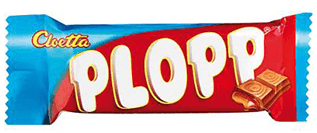
Ever since I discovered Plopp, whenever and wherever I travel, I visit local grocery stores to scour the shelves for products with unintentionally amusing brand names dubbed by companies that—to my delight—innocently misinterpreted English words, thereby creating priceless brand-name blunders. Here are some unique products I've come across both abroad and at home that use English names for products with results that are quite humorous.
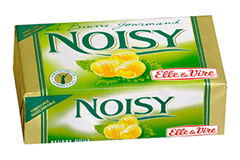
Why settle for quiet, ordinary butter when you can spread something on your toast to wake up the entire neighborhood? Nothing screams butter like Noisy. From France comes butter that if melted and spilled can easily be cleaned up with Shout stain remover.
Introduced in 1992 by the Elle & Vire company, founded as a cooperative in 1945 by farmer Auguste Grandin in the township of Condé-sur-Vire in Normandy, Noisy butter exudes a gourmet hazelnut flavor. The brand name stems from the French word noisette, which means "hazelnut," explaining the illustration of hazelnuts on the packaging. Ending a product name with the suffix "y" is popular in France, the same way American companies end many product names with the suffix "ex" (such as Kleenex, Playtex, Timex and Windex). In French, Noisy is softly pronounced nwah-ZEE (as if butter should be seen and not heard). But I use the English pronunciation because, frankly, I prefer brazen butter, for crying out loud.
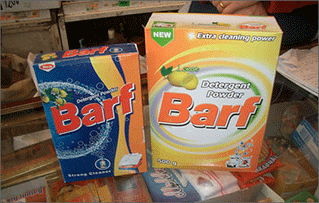
In Iran, people put Barf in their washing machines. "Barf will get your clothes amazingly clean," boast the instructions on the side of the box. "To obtain best results of Barf . . . soak the clothes in a solution of Barf for a few hours or preferably overnight and then wash as usual." In Farsi, the word barf means "snow," and if you love the smell of Barf, you can use the extensive line of Barf products to soak your underwear, shampoo your hair or wash your entire body . . . in Barf.
Paxan, an Iranian company founded in 1962, proudly produces Barf and other hygiene products. CEO Hooshang Balazadeh Niri states that the company's mission is "upgrading society health," by, presumably, churning out top-notch Barf. The side of the box reports even more reassuring news: "Barf is safe for all washable fabrics."
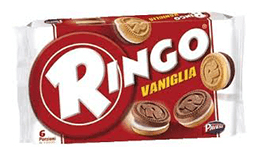
Does the former Beatle endorse or bake these tasty Italian sandwich cookies (a chocolate wafer and a vanilla wafer with a cream filling in between)? A quick examination of the tube-shaped package reveals that Pavesi, a biscuit company founded in 1937 by Mario Pavesi in Novara, Italy, began making the sandwich cookies in 1967, the same year the Beatles released "Strawberry Fields Forever" and "All You Need Is Love." Pavesi claims he named the sandwich cookies Ringo because of their circular shape and the way the two wafers surround the cream filling—although he freely admits that in the 1960s he traveled to America to seek inspiration and tap into teenage fashions and trends. Did Pavesi intentionally borrow Ringo Starr's name? Or was he inspired by the 1965 spaghetti Western A Pistol for Ringo, which tells the story of a 19th-century outlaw? Do you want to know a secret? We may never know. But I can tell you this much: Ringo Starr has never endorsed the cookies.
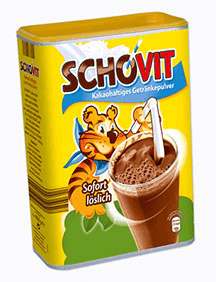
When your kids yell, "I'm thirsty!" now you can reply, "Schovit!" And no one is offended. From Germany comes a chocolate powdered drink mix for both hot and cold milk that—in English—suggests that, well, you drink it really fast?
A store brand produced and sold exclusively at Aldi-Nord grocery stores in Northern Europe, Schovit (pronounced SHOH-fit.) is a hybrid name formed by combining the first syllables of the German words schokolade (meaning "chocolate") and both vital (for the abundance of essential glucose in the product) and vitamins (for the added vitamins above the recommended daily dose). The easily misconstrued name may explain why this vitamin-boosted chocolate mix has yet to achieve popularity in English-speaking countries.

In America, the name Wonder Bread always made me wonder if the product is really bread. But the name of the Mexican equivalent—Bimbo Bread—makes me wonder what kind of person buys it.
In 1945 in Mexico City, baker Lorenzo Servitje and four partners founded Panificacion Bimbo, a bakery named after their mascot, a cuddly white teddy bear wearing a baker's hat. The bear signifies the bread's tenderness, whiteness and softness. The name Bimbo—pronounced BEEM-bo, a combination of the words bingo (the popular game) and Bambi (the 1942 Disney movie)—has no meaning in Spanish. The company founders must have had no idea that, in English, the word bimbo—derived from the Italian word bambino, meaning "little boy"—means "a foolish, stupid, or inept person."
Bimbo Bakeries now operates in 19 countries, and parent company Grupo Bimbo has become the largest bread manufacturing company in the world. Seeing the company's white delivery trucks, emblazoned with the word Bimbo in huge red letters, made me wonder, "Who's driving that truck? What's inside it? And do I really want to know?"
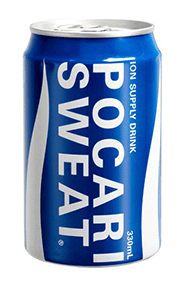
In vending machines on many street corners in Tokyo, you can buy bottles and cans of a sports drink called Pocari Sweat, which was launched in 1980 by Otsuka Pharmaceutical Inc. Although the name of the "ion supply" beverage may not sound appetizing to anyone fluent in English, Pocari Sweat actually tastes sweet, with a touch of grapefruit flavor. The peculiar name stems from the idea that the product replaces nutrients and electrolytes lost through sweating. Although the company claims that Pocari is a made-up word chosen for its "light and nice tone," the name may be a combination of the first syllables of two main ingredients: the nutrients potassium and calcium. Japanese companies frequently name products by combining English words using Japanese syntax as a creative device—oblivious to the literal meaning. If I still worked in advertising, I'd urge the company to promote its sports drink with the slogan "Pocari Sweat? No sweat." That's probably why I no longer work in advertising.
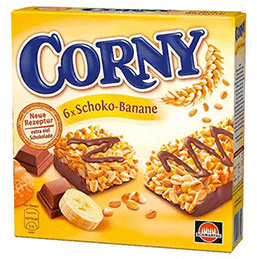
Introduced in 1984 by the German company Schwartauer Werke in Bad Schwartau, a peaceful spa town near the Baltic Sea that is famous for its iodide saline waters, iconic Corny cereal bars come in a variety of delicious flavors to satisfy all Corny fans.
Corny Classic, Corny Big, and Corny Free are all made from korn (meaning "grain" in German), not corn (known in Germany as mais). Corny cereal bars contain mostly oats, barley, and rye. The product name is a misspelling of the German word korn combined with the English suffix "y," best translated in English as "grainy"—probably not the best name for a cereal bar, either.
Schwartauer Werke executives had no idea that in English the word corny means "trite" or "lacking in subtlety." That's because the word for corny in German is kitschig, the source of the English word kitsch. Yet despite its unusual English name, Corny sells more than 200 million cereal bars a year. And there's absolutely nothing corny about that.
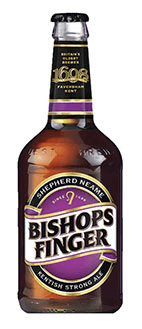
One of the oldest bottled beers in the United Kingdom, Bishops Finger does not contain a finger—like the agave worm found at the bottom of a bottle of mescal. A bishop never dipped his finger into a vat of the beer, nor—thankfully—is the ale brewed from the severed fingers of clergymen.
Who's responsible for the odd name? Point the finger at Laurie Neame, managing director of Shepherd Neame, Britain's oldest brewery, founded in 1698 in Faversham, a market town in Kent.
In 1958, shortly after the rationing of malt ended in the wake of World War II, head brewer Gordon Ely produced the brewery's first strong ale from homegrown malted barley and Kentish hops. Neame named the beer to commemorate the finger-shaped signposts unique to Kent that pointed pilgrims along the route to the tomb of Thomas Becket in Canterbury Cathedral—before its destruction by Henry VIII in the 16th century.
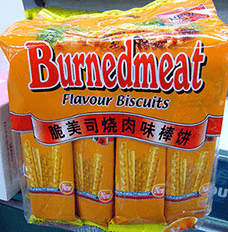
"Burnedmeat Flavour Biscuits" may sound inedible, but rest assured the name merely reflects a mistranslation by Dongguan City Golden Fuji Food Co. in Guangdong, China. Chinese manufacturers also give their products English names without concern for negative connotations. Burnedmeat Flavour Biscuits actually taste delicious, like spicy, grilled pretzels. The Chinese characters on the package literally translate to "crispy delicacy fried meat flavored stick-cake." A savvy English-speaking advertising copywriter would likely have given the product a more appetizing name, like "barbecue-flavored pretzel sticks." The evocative name Burnedmeat does capture the attention of food shoppers—making the name seem like inspired genius.
Founded in 1996, Dongguan City Golden Fuji Food Co. develops and manufactures a wide variety of biscuits, cookies, wafers, shaqima (a Chinese pastry), and egg rolls—sold throughout China and around the world. According to the Golden Fuji website, the company hopes "to develop more excellent products and service for customers. Let us work hand in hand to build a brilliant future!"
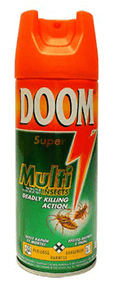
Well, you have to admit "Doom" sounds much catchier than "Armageddon" or "Judgment Day." Besides, nothing sells like overkill. Why simply exterminate bugs when you can annihilate them with "deadly killing action"? It's slightly redundant, sure, but what good is an insecticide with "non-deadly killing action"?
For manufacturer Tiger Brands Ltd. in Bryanston, South Africa (a suburb of Johannesburg), every day is Doomsday—for flying and crawling insects—which makes the company a genuine merchant of doom. At www.doom.co.za, you can watch a series of astoundingly clever commercials for the subtly named insecticide. Surprisingly, the company has yet to market a sister product for Doom called Gloom, which might make an excellent name for an air freshener, a window cleaner, or a floor wax.
You Might Also Enjoy Reading:
Copyright Ⓒ 2014 by Joey Green. All rights reserved. Reprinted from American Way magazine.